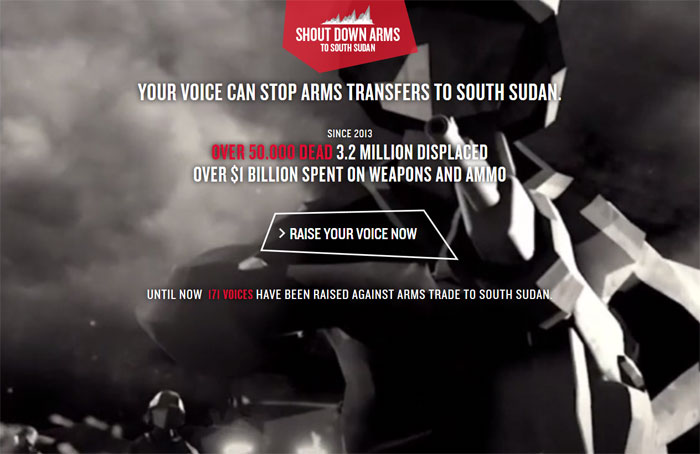Conflict has been raging in South Sudan since December 2013. Political solutions have so far failed to yield results as ceasefires are violated and fighting continues. The humanitarian impact is dire. The international campaign #shoutdownarms wants to induce the UN Security Council to impose an arms embargo on South Sudan, which would stop the supply of arms and ammunition to the government.
While a political solution to the conflict is necessary, making fewer arms available both to government and rebel forces will help reduce violence and send a powerful signal that the conflict needs to end. PAX supports this campaign and you can help out here: www.shoutdownarms.com
PAX cooperates in South Sudan with SSANSA (South Sudan Action Network on Small Arms). Together we work on programs for disarmament and improvement of the safety situation. In those programs we focus on participation of civilians. Geoffrey L. Duke is secretary of SSANSA. His statement about the embargo:
‘South Sudan needs bags of grain and not bullets’
Why is advocating for an arms embargo for South Sudan promising at this moment?
The IGAD (Intergovernmental Authority on Development which is mediating the conflict) already took a promising step in its heads of states summit held in November 2014. Their communiqué, which stipulates the readiness of the regional bloc to impose an arms embargo on any party violating the cessation of hostilities agreement. Clearly both parties have continued to violate the cessation of hostilities agreement. Therefore, it is time to activate the promised arms embargo on the parties. In December 2014, the Arms Trade Treaty (ATT) in Geneva entered into force, with 69 countries around the world ratifying it. Its purpose is to reduce the human suffering caused by the irresponsible trade in conventional weapons. It espouses the basic principle that governments should only authorize an arms transfer if it is confident its contents will not be used in attacks on civilians and other grave violations of international humanitarian law.
Are extensive arms purchases not in the best interest of South Sudan, given the precarious safety situation?
South Sudan is in the grip of a brutal armed conflict that has claimed thousands of lives. The U.N. has documented ethnically targeted killings, rape, looting, enforced disappearances, and direct attacks on civilians by all parties involved. It has also warned that all sides may be guilty of war crimes and crimes against humanity. Our government is spending tens of millions of dollars on weapons, while the country is on the brink of famine. Many in South Sudan would wish that available government funds be spent on bags of grain, not bullets.
In what ways does the arms influx fuel the conflict and general insecurity in South Sudan?
“Arming one side in the conflict is tantamount to arming all sides. In South Sudan there is already a wealth of evidence that the arms and ammunition acquired by the Government of South Sudan have fallen into the hands of opposition forces. We have seen government forces defect to join the opposition, taking their arms and ammunition with them. And opposition forces have captured government arms during battles. Moreover, the conflict has further weakened security of state stockpiles of arms. Consequently, arms are quickly spilling into the public sphere, ending up in the hands of civilians and on the black market. This is adding to the already widespread proliferation of arms among civilians that the country has been struggling with since the end of the Sudan civil war in 2005. Just recently, 11 arms traffickers were intercepted in Lakes State carrying the latest M12 rifles acquired by the government. These arms were headed to the illicit market.”
Geoffrey L. Duke is secretariat team leader with the South Sudan Action Network on Small Arms (SSANSA)
Raise your voice now: www.shoutdownarms.com




